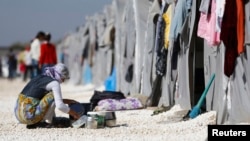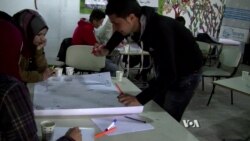Nearly four years of conflict in Syria have sent more than 5 million Syrians into neighboring countries where they face many challenges.
Turkey is hosting more than 1.5 million of these refugees and Turkish humanitarian groups have stepped up to help.
On a wintry day in the old quarter of Sanliurfa, young Syrian refugees work on a project at the Urfa Community Center. They are to illustrate the story of two friends who drift apart after of one of them befriends a girl and how they eventually reconcile.
There is a purpose to the exercise, said social worker Mahmoud Sleiby, who himself fled Syria two years ago.
“When they are taking [doing] these activities they are feeling more hope. They are saying, ‘we can do it.’ When they come from Syria to Turkey, they don’t have any hope to continue their life. But we start to do simple things to make them stay in this life,” Sleiby said.
Many refugees suffer from fear, anxiety and stress. The center calls in psychologists to deal with severe cases.
It also has programs to help the refugees adjust to the different culture in Turkey. One of these is Turkish language classes.
In another room, women take sewing lessons. They are learning to make clothes for their families or to sell.
In another, there are free computers and Internet access to help students with their studies or those who just want to communicate with family members.
Difficulties refugees face
One of the center’s officers, Umutcan Yuksel, said refugees can sometimes have a difficult time integrating into the local society.
“When they first came to Turkey, the host communities welcomed them. But after some economic and social problems, they separated. Maybe violence is coming. And for this, we have intercultural activities,” Yuksel said.
The center’s 34 staff members and 100 volunteers have helped more than 20,000 refugees since it opened 18 months ago. Workers said their greatest joy is seeing the change in the young children.
“When children first came here, they are [were] silent, always silent. But after two or three months, they could make children’s theater. And we improve their self-trust. We improve their self-respect here. I think it’s the biggest achievement here,” Yuksel said.
He said when the children first arrived, their drawings were about war and violence. Now, he says, they draw flowers.














